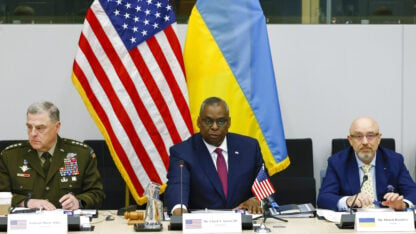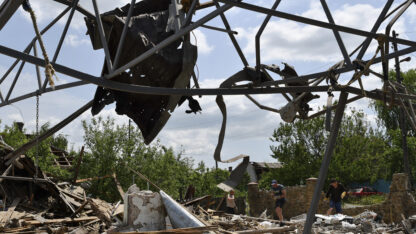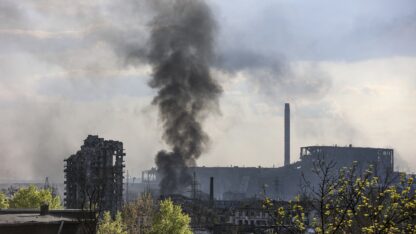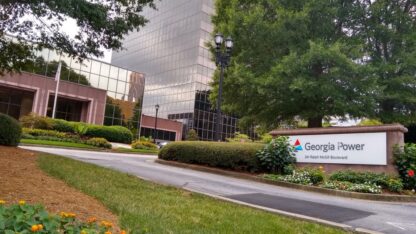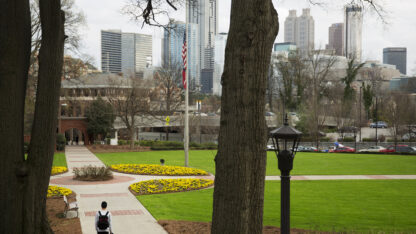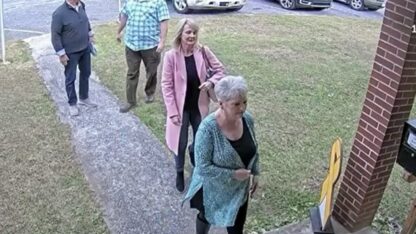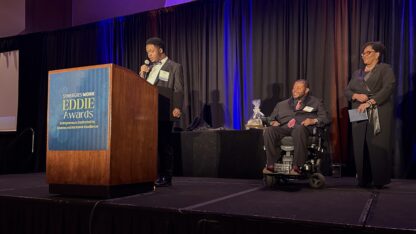Ukraine gets possible path to EU, aid pledges from Britain
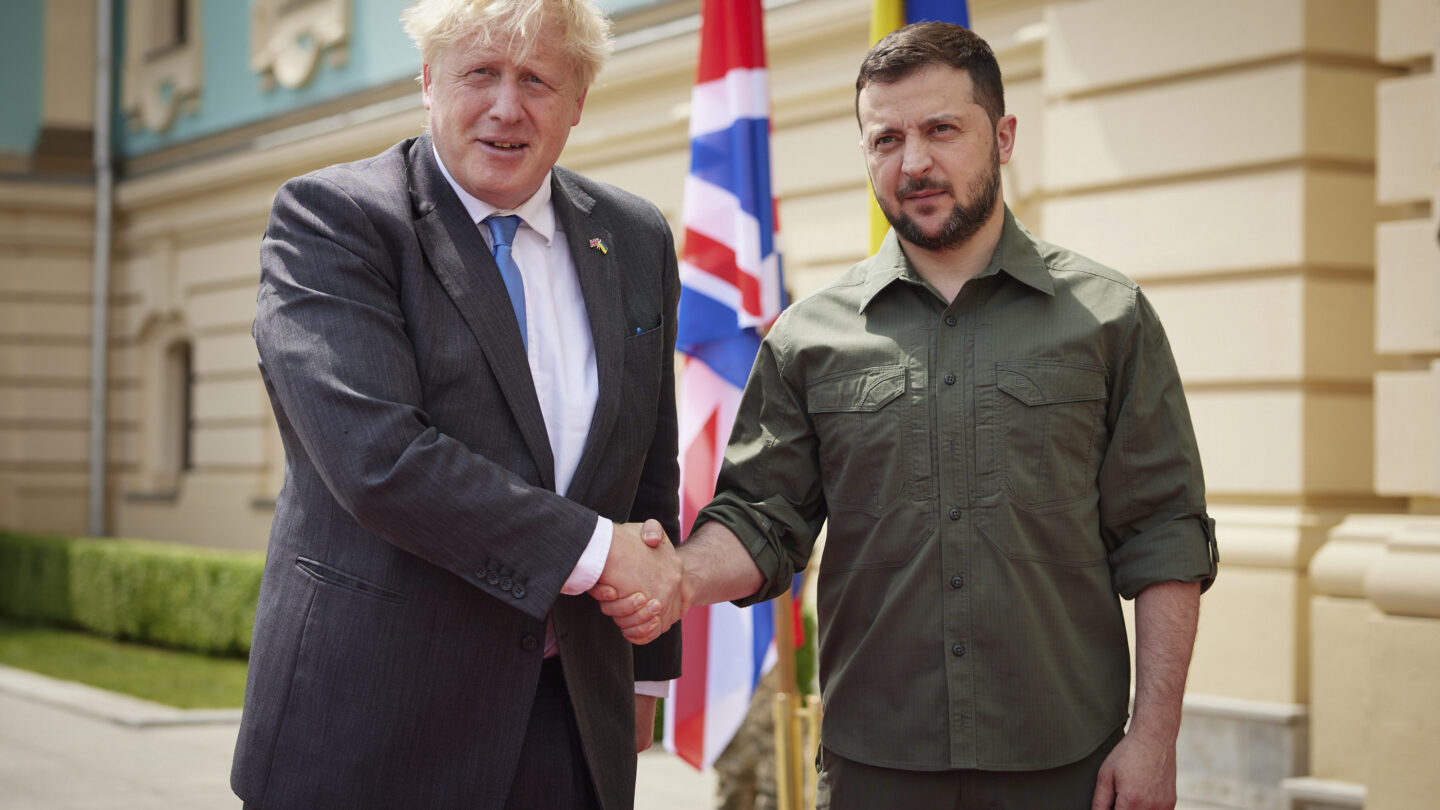
The European Union’s executive arm recommended putting Ukraine on a path to membership Friday, a symbolic boost for a country fending off a Russian onslaught that is killing civilians, flattening cities and threatening its very survival.
In another show of Western support, British Prime Minister Boris Johnson arrived in Kyiv to meet with President Volodymyr Zelenskyy to offer continued aid and military training, adding that evidence points to Russia “taking heavy casualties” in the invasion.
The latest embrace of Ukraine by its European allies marked another setback for Russian President Vladimir Putin, who launched his war nearly four months ago, hoping to pull his ex-Soviet neighbor away from the West and back into Russia’s sphere of influence.
At Russia’s showpiece economic forum in St. Petersburg on Friday, Putin said Moscow “has nothing against” Ukraine joining the EU, because it “isn’t a military organization, a political organization like NATO.” He also reprised his usual defense of the war, alleging it was necessary to protect people in parts of eastern Ukraine controlled by Moscow-backed rebels and to ensure Russia’s own security.
Johnson’s trip to Kyiv followed one a day earlier by the leaders of Germany, France, Italy and Romania, who vowed to support Ukraine’s fight without asking it to make any territorial concessions to Russia.
“We are with you to give you the strategic endurance that you will need,” Johnson said on his second visit to the country since the Feb. 24 start of the war. Although he did not detail the aid, he said Britain would lead a program that could train up to 10,000 Ukrainian soldiers every 120 days in an unspecified location outside the country.
The British-led training program could “change the equation of this war,” Johnson said. Ukraine has been taking heavy casualties in the battle for the country’s eastern industrial heartland.
“I completely understand why you and your people can make no compromise with Putin because if Ukraine is suffering, if the Ukrainian troops are suffering, then I have to tell you that all the evidence is that Putin’s troops are under acute pressure themselves and they are taking heavy casualties,” he said. “Their expenditure of munitions, of shells and other weaponry, is colossal.”
He said that two months after his last visit, “the Ukrainian grit, determination and resilience is stronger than ever, and I know that unbreakable resolve will long outlive the vain ambitions of President Putin.”
Johnson said his government will work to intensify the sanctions on Russia. He praised the resilience of Ukrainians and how “life is coming back to the streets” of Kyiv, but noted that “only a couple of hours away, a barbaric assault continues. Towns and villages are being reduced to rubble.”
Zelenskyy welcomed Johnson’s visit, saying on Telegram: “We have a common view of the movement towards Ukraine’s victory. I’m grateful for a powerful support!”
The possibility of membership in the EU, created to safeguard peace on the continent and serve as a model for the rule of law and prosperity, fulfils a wish of Zelenskyy and his Western-looking citizens.
The European Commission’s recommendation that Ukraine become a candidate for membership will be discussed by leaders of the 27-nation bloc during a summit next week in Brussels. The war has increased pressure on EU governments to fast-track Ukraine’s candidate status. But the process is expected to take years, and EU members remain divided over how quickly and fully to open their arms to new members.
Political and military support for Ukraine from Western countries has been key to its surprising success in the face of larger and better-equipped Russian forces. Zelenskyy has also clamored for additional immediate support in the form of more and better weapons to turn the tide in the east, known as the Donbas region.
In St. Petersburg, Putin decried the sanctions imposed on Russia by the U.S. and its allies as “insane and, I would say, reckless.”
“The calculation was understandable: to impudently, with a swoop, crush the Russian economy by destroying business chains, forcing the withdrawal of Western companies from the Russian market, freezing domestic assets, hitting industry, finance, and the people’s standard of living. It didn’t work,” he said.
Russia pressed its offensive in the east, leaving desperate residents struggling to make sense of their future.
“We are old people, we do not have a place to go. Where will I go?” asked Vira Miedientseva, an elderly resident grappling with the aftermath of an attack Thursday in Lysychansk, just across the river from Sievierodonetsk, where a key battle is raging.
The Ukrainian military said Moscow’s troops kept up relentless attacks on both Sloviansk and Sievierodonetsk, two key cities that have been the focus on recent fighting. The military claimed Ukrainian forces pushed Russian fighters out of the village of Bohorodychne, north of Sloviansk.
Russia and its allies say they have taken about half of Donetsk and nearly all of Luhansk — the two regions that make up the Donbas. Sievierodonetsk and surrounding villages are in the last pocket of Luhansk region still in Ukrainian hands.
“The Russians are pouring fire on the city,” said Luhansk Gov. Serhiy Haidai. “It’s getting harder and harder for us to fight in Sievierodonetsk, because the Russians outnumber us in artillery and manpower, and it’s very difficult for us to resist this barrage of fire.”
The constant shelling made it impossible for 568 people, including 38 children, sheltering in the Azot chemical plant in the city to escape, he said.
Russian forces have destroyed all three bridges leading out of the city, but Haidai said it still had not been fully blocked off.
The Moscow envoy for Russia-backed separatists who control much of the territory around Sievierodonetsk said an evacuation from the Azot plant could take place under certain conditions.
Rodion Miroshnik of the self-proclaimed Luhansk’s People’s Republic said on social media that Russian troops and separatists are “ready to consider options for opening a humanitarian corridor for the exit of civilians, but subject to strict adherence to the cease-fire.”
Earlier this week, Miroshnik accused Kyiv of trying to disrupt the evacuation of civilians from Azot, a claim vigorously denied by Ukrainian officials.
Lukatsky reported from Lysychansk, Ukraine.
Follow the AP’s coverage of the war at https://apnews.com/hub/russia-ukraine
